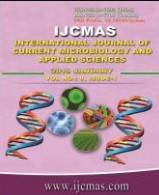


 National Academy of Agricultural Sciences (NAAS)
National Academy of Agricultural Sciences (NAAS)

|
PRINT ISSN : 2319-7692
Online ISSN : 2319-7706 Issues : 12 per year Publisher : Excellent Publishers Email : editorijcmas@gmail.com / submit@ijcmas.com Editor-in-chief: Dr.M.Prakash Index Copernicus ICV 2018: 95.39 NAAS RATING 2020: 5.38 |
The recombinant inbred lines (RILs) serve as useful source of pure-lines with desired combination of traits. Also, the chances of recovering high-yielding genotypes from RIL population are higher than those recoverable from F2 populations handled through pedigree breeding. The 157 RILs derived from HACPI 3and 144 RILs derived from HACPI 6 and three check entries [HA 3, HA 4 and kadalavare] of dolichos bean were evaluated for six qualitative traits and nine quantitative traits at the University of Agricultural Sciences (UAS), Bengaluru, India, during 2014 and 2015 rainy seasons. Substantial variability among the RILs for quantitative traits and polymorphism for qualitative traits were documented. The pooled analysis of variance revealed highly significant mean squares attributable to RILs, checks and RILs vs. checks for all the traits in both the populations. The RILs, 3-26 and 3-35 were particularly superior to all the three checks, HA 3, HA 4 and kadalavare for fresh pods plant-1, fresh pod yield plant-1 and fresh seed yield plant-1. HACPI 3-derived RILs such as, 3-3, 3-26, 3-30, 3-35, 3-40, 3-95, 3-134, 3-139, 3-141, 3-185 and those derived from HACPI 6,such as,6-262, 6-278, 6-310, 6-356, 6-364, 6-366 and 6-367 were promising for multiple quantitative traits and also for farmer and consumer-preferred qualitative traits. These RILs are suggested for preferential use in breeding high yielding dolichos bean varieties with desirable pod traits.
 |
 |
 |
 |
 |